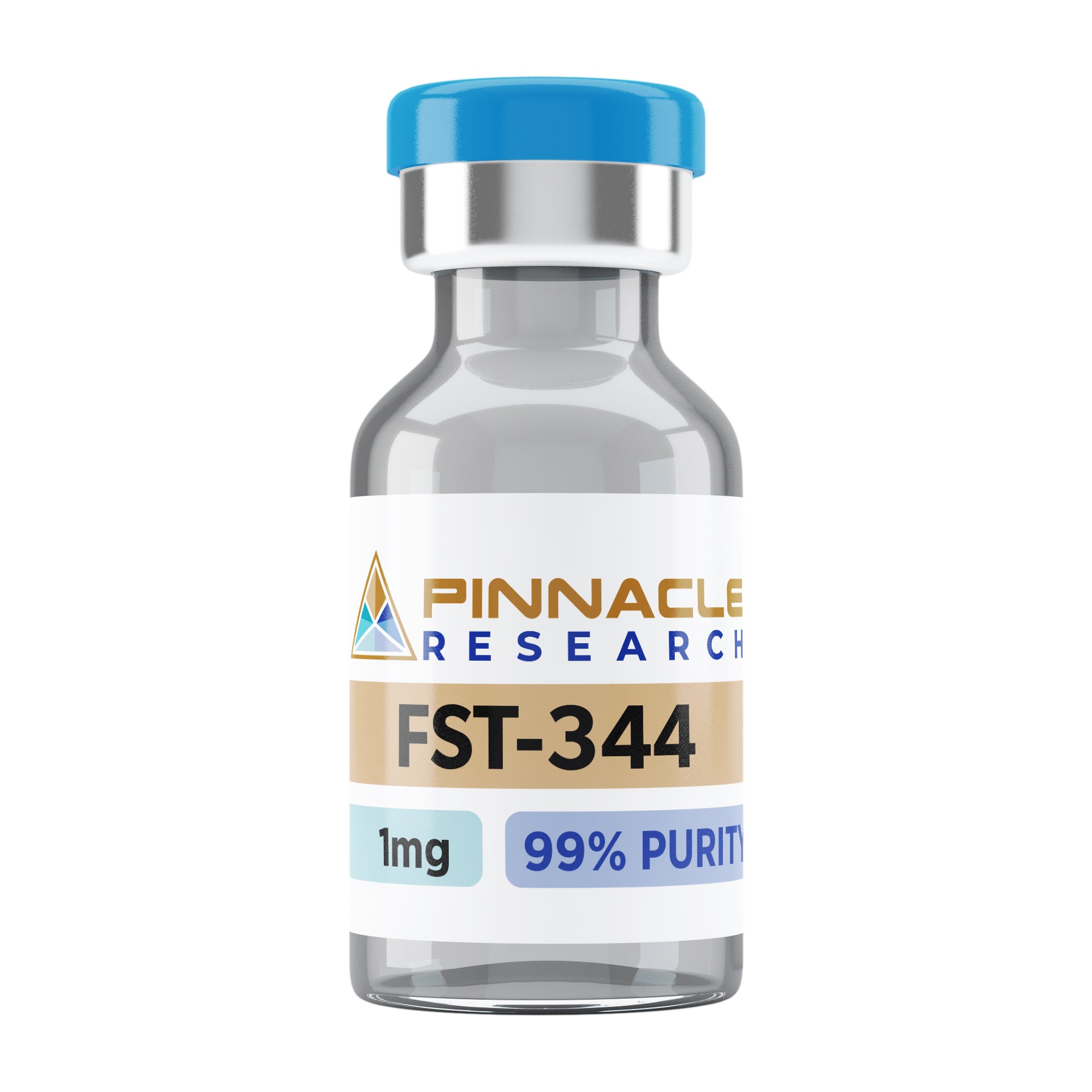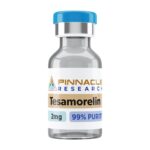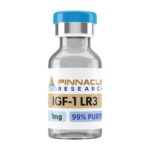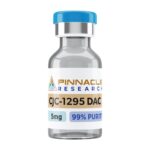About FST-344
The Follistatin-344 peptide is a synthesized and analog version of the naturally produced Follistatin and is associated with neutralizing the facets of follicle-stimulating hormone (FSH), Myostatin, and activin. Previous studies on animals regarding the three compounds reveal that FSH, Myostatin, and activin affect specific inflammatory responses, scar formation, hypertrophy, and hyperplasia.
What is Follistatin-344
The Follistatin-344 is an altered analog version of Follistatin, which occurs naturally in the human body. The synthetic compound can still be altered further to have more variations of Follistatin. Nearly all the higher animals have naturally occurring Follistatin in their body tissues. Due to gene splicing, Follistatin comes in two unique isoforms. The primary function of the compound is neutralizing bodily proteins found in the TGF-beta superfamily. It’s famous for effectively neutralizing the TGF-beta superfamily proteins. Hence it can optimally neutralize the effects of follicle-stimulating hormones, Myostatin, and activin.
Chemical Structure of Follistatin-344
- Sequence: MVRARHQPGG LCLLLLLLCQ FMEDRSAQAG NCWLRQAKNG RCQVLYKTEL SKEECCSTGR LSTSWTEEDV NDNTLFKWMI FNGGAPNCIP CKETCENVDC GPGKKCRMNK KNKPRCVCAP DCSNITWKGP VCGLDGKTYR NECALLKARC KEQPELEVQY QGRCKKTCRD VFCPGSSTCV VDQTNNAYCV TCNRICPEPA SSEQYLCGND GVTYSSACHL RKATCLLGRS IGLAYEGKCI KAKSCEDIQC TGGKKCLWDF KVGRGRCSLC DELCPDSKSD EPVCASDNAT YASECAMKEA ACSSGVLLEV KHSGSCNSIS EDTEEEEEDE DQDYSFPISS ILEW
- Molecular Weight: 3780 g/mol
- Synonyms: FSH-Suppressing Protein, Activin-Binding Protein, FST
Follistatin-344 Research
Muscle Growth
The Myostatin protein is a TGF-beta protein family member and inhibits muscle cell differentiation and growth. Since it falls in the TGF-beta protein family, Follistatin can inhibit it. Past research studies reveal that animals lacking the Myostatin protein had significant muscle growth and stronger muscles. Scientists speculated that administration of the FSH-Suppressing Protein could help in triggering muscle growth and strength by inhibiting the Myostatin protein. During mouse models, researchers discovered that Follistatin-344 triggered increased lean muscle mass in the mice without implementing any exercise or special dietary requirements. In just ten weeks, the mice administered with FSH-Suppressing Protein experienced 10% more muscle growth and strength than those in the control group.
Other studies on mammals have confirmed the connection between Follistatin therapy and increased muscle strength and growth. These studies revealed that FSH-Suppressing Protein enhanced the strength and growth of lean muscle mass by triggering the insulin/IGF-1 pathway. Shockingly the body only requires one signaling protein molecule to initiate a full anabolic effect. When administered, the FSH-Suppressing Protein influences the pancreas to secrete more insulin, making researchers speculate that the effects of FST-344 can be mediated through insulin itself.
Improve Survival in Breast Cancer
A clinical study using RT-PCR (reverse transcription polymerase chain reaction) examined the presence of Follistatin in breast tumor tissues. The study also used immune-histochemistry techniques and discovered that the levels of Follistatin were low in most cases of breast cancer but were high in some cases. When the Follistatin was at high levels, the tumors grew faster but were less invasive. Hence researchers concluded that the presence of Follistatin in the tissues correlated strongly with reduced breast cancer metastasis and increased survival. Scientists later confirmed the theory in a study involving the mouse model of HER2-positive breast cancer, which showed the ability of Follistatin to suppress metastasis. Unfortunately, Follistatin isn’t present in the average breast cancer tissue. When administered, the Follistatin blocks the breast epithelial cells from activin-induced migration and completely blocks the formation of lung metastases. But it doesn’t affect the growth of the tumor.
Esophageal Cancer
Research studies have confirmed that BMP (bone morphogenic protein) is a causal agent of esophageal cancer. The proteins facilitate the changing of ordinary esophageal tissue to Barrett’s esophagus, which is the precursor of esophageal cancer. It has also been confirmed that acid reflux over-activates bone morphogenic protein, and preventing the over-activation can help prevent the development of Barrett’s esophagus. Follistatin supplementation is one of the most effective ways of preventing acid reflux over-activation of BMP. More research and studies on animal models are yet to be done to provide more anecdotal evidence for this theory.
More studies have revealed more potential health benefits of FSH-Suppressing Protein as a potential treatment for various cancer types and a treatment for reducing the effects of cancer.
Liver Protection
The FSH-Suppressing Protein is associated with offering extra protection to the liver, particularly in the early phases of fibrosis, slowing the progress of liver disease. Rats undergoing the FSH-Suppressing Protein treatment experienced a 32% decrease in fibrosis growth four weeks after starting the treatment.
Congenital Blindness
The TGF-beta signaling is substantially associated with the extracellular matrix and fusion of the optic nerve. Research studies have revealed higher levels of the TGF-beta proteins; specifically, the bone morphogenic protein (BMP) suppresses optic fusion leading to blindness. The best way of preventing such a scenario is by inhibiting these proteins. There is little research focusing on Follistatin supplementation in pregnancy to ensure the suppression of the TGF-beta proteins and prevent possible congenital blindness in infants.
Hair Growth
When FSH-Suppressing Protein is combined with other hair-growth stimulants, subjects can experience improved hair growth. During a test trial that involved 26 individuals, individuals who used FSH-Suppressing Protein experienced a 20% increase in hair density and a 13% increase in hair thickness.
The research studies on the effectiveness of FSH-Suppressing Protein cover various human conditions ranging from muscle growth to cancer. There is excellent potential concerning the health benefits we can get from FSH-Suppressing Protein treatment. Researchers can also have a chance to probe deeper into human anatomy and discover more benefits of the protein.
BUY FST-344 ONLINE
Massive potential in Follistatin research includes the possibility of developing treatment therapies for various human conditions. Continue reading more content and research studies to learn more about the potentiality of FSH-Suppressing Protein.




